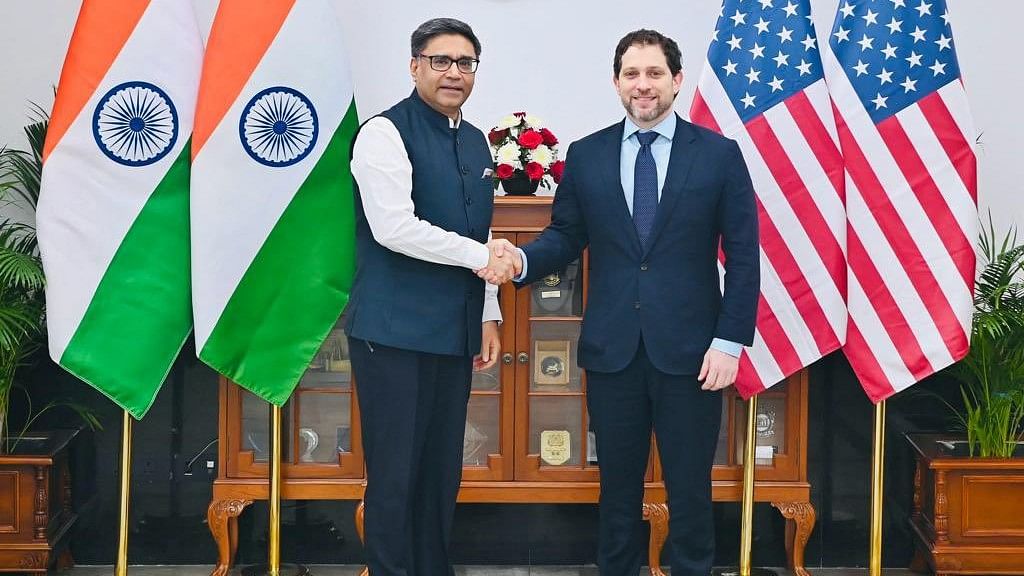
India’s Deputy National Security Adviser Vikram Misri with Jonathan Finer, the Principal Deputy National Security Adviser of the US.
Credit: X/@VikramMisri
New Delhi: A senior official of President Joe Biden’s administration in Washington DC met his counterpart in New Delhi on Monday to review the progress made in implementing the India-US Initiative on Critical and Emerging Technologies (iCET), although the bilateral relations came under a shadow over an alleged assassination plot.
India’s Deputy National Security Adviser Vikram Misri hosted Jonathan Finer, the Principal Deputy National Security Adviser of the US, for a meeting in New Delhi to review the progress made in building technology value chains under the framework of the iCET.
“They expressed satisfaction with ongoing collaborations in diverse domains including semiconductors, quantum, Artificial Intelligence (Al) and High-Performance Computing (HPC), defence innovation, space, and advanced telecommunications through interactions between the respective governments, industry, academia and other stakeholders,” according to the Ministry of External Affairs (MEA).
The meeting between Misri and Finer was the first high-level bilateral engagement after the relations came under a shadow following the indictment of a citizen of India by the US Justice Department in connection with an alleged plot to assassinate a Canadian-American Khalistani Sikh separatist leader Gurpatwant Singh Pannun.
“Delighted to meet today with my #US counterpart, Principal Deputy NSA Jonathan Finer and discuss with him the ever-expanding and ever more important #India #US strategic partnership, including #iCET,” Misri posted on X after he met Finer.
Finer said at an event in New Delhi later that although no two countries could be perfectly aligned, the US and India have worked well together.
They had the meeting even as the two sides continued discussion about the possibility of Biden visiting New Delhi once again next month to attend the Republic Day ceremony as the chief guest.
The US president visited New Delhi from September 8 to 10 to attend the G20 summit hosted by Prime Minister Narendra Modi. New Delhi extended an invitation to him to visit once again, this time to be the chief guest of the Republic Day ceremony on Kartavya Path on January 26. The White House, however, has not yet confirmed the acceptance of the invitation extended to the US President by India.
The bilateral relations came under a shadow after Indian citizen Nikhil Gupta was arrested from the Czech Republic and the US Justice Department recently indicted him of hiring a hitman on behalf of an unnamed official of the Government of India to kill Pannun. The allegation came just two and a half months after Canada accused India of having a role in the killing of Khalistani Sikh extremist Hardeep Singh Nijjar in the North American country.
The two Deputy National Security Advisers on Monday also reviewed the key bilateral issues and exchanged views on regional and global developments.
Modi and Biden launched the iCET to facilitate outcome-oriented cooperation in new and emerging technologies.
The iCET is co-led by the National Security Council secretariat in India and the US National Security Council.
Finer and Misri reiterated their commitment to fulfilling the vision of Modi and Biden for elevating the bilateral strategic partnership and agreed to broaden the scope of the iCET to biotechnology, critical minerals and rare earths processing technologies, digital connectivity and digital public infrastructure, and advanced materials. They also affirmed the importance of easing regulations to facilitate high-tech collaborations, and transfer of technology. Their discussions served to highlight the immense potential to tap synergies between their domestic initiatives and boost the competitiveness of industry in both countries.
Finer also called on National Security Adviser Ajit Doval and External Affairs Minister S Jaishankar.
